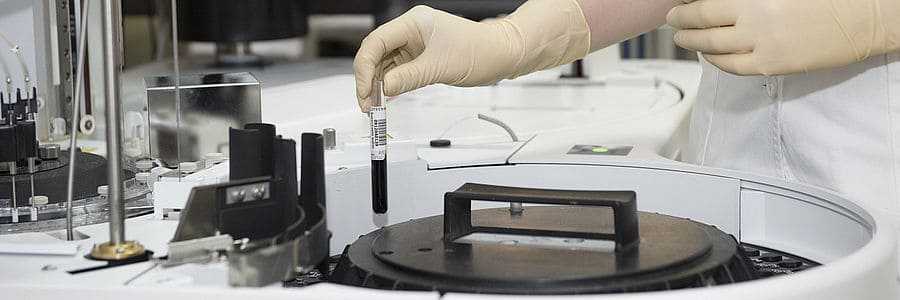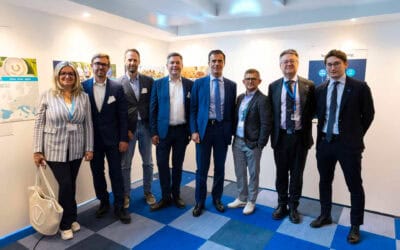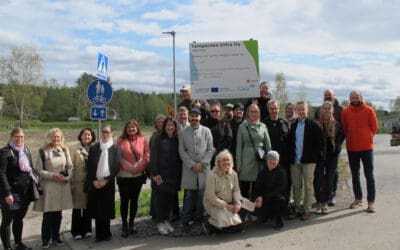Cooperation in health care proves to be an elementary need and an expression of mutual assistance in times of the COVID-19 pandemic. Interreg Baltic Sea Region has been supporting several initiatives which trigger the exchange of good practices across borders to improve various aspects of the health care systems in the Baltic Sea region. They could be of help to local and regional authorities when overcoming short and long-term consequences of the current crisis.

From biomarkers used for diagnostics that can enter markets faster, help to public health authorities in tackling lifestyle-related diseases, to boosting cooperation among health laboratories: the scope covered by Interreg Baltic Sea region projects is wide. They apply to varied aspects of improving people’s health and health care systems in the Baltic Sea region by means of exchanging good practices, innovative solutions and the know-how. The EU funding is used here to create favourable environment to let great local solutions become common practice in the Baltic Sea region and beyond.
The catalogue of Interreg Baltic Sea Region projects tackling health-related issues:
BIC: Biomarker Commercialization
Biomarkers measure cellular, biochemical or molecular changes in human tissues, cells or fluids, and contribute to future diagnostics and treatment. The development of biomarkers is time consuming and expensive, requiring the involvement of industry from early stages to better direct the research. The BIC platform facilitates knowledge and best practice exchange, offering tools that support the various phases of a commercialization process and maturity assessment. Click here to learn more about the project.
ProVaHealth: Product Validation in Health
ProVaHealth stimulates cooperation among health laboratories in the Baltic Sea region, which test new products and technologies in real-life contexts. The project shares best practices to improve business models of the labs and helps open access to the services for small and medium sized enterprises (SMEs) from the entire Baltic Sea region to ensure health innovation and growth of health SMEs with global potential. Click here to learn more about the project.
BaltCityPrevention: Baltic Cities tackle lifestyle related diseases – The development of an innovative model for prevention interventions targeting public health authorities in the Baltic Sea Region
Strokes, obesity, and heart and lung diseases are among the health challenges in Europe. This implies a new service development approach in the public health sector. The project helps public health authorities in cities around the Baltic Sea to better promote healthy lifestyle by developing and testing a model that public health authorities can apply in prevention intervention planning. Click here to learn more about the project.
Healthy Boost: Urban Labs for Better Health for All in the Baltic Sea Region – boosting cross-sectoral cooperation for health and well-being in the cities
The Healthy Boost project addresses the health burden of city residents due to unhealthy lifestyles. Cities such as Poznan, Klaipeda, Jelgava, Tartu and Turku experiment with different methods of community participation, health learning or cross-sectoral cooperation. The main objective of the project is to make urban policies for health and well-being more innovative, more effective and more integrated. This includes work on cross-sectoral cooperation with potential to be used in other fields as well. Click here to learn more about the project.
BFCC: Baltic Fracture Competence Centre
The number of bone fractures and linked health disorders are going to increase in the future due to an ageing society. The project set up local registries and link them together in one transnational data registry. Hospitals and companies in the Baltic Sea region will use the registry to identify needs and potentials for innovation within fracture management. Click here to learn more about the project.
For Better Health: Practical implementation of Health in All Policies in the municipalities for better health for all in the Baltic Sea Region
Today, life-style related diseases account for 80% of premature deaths in the Baltic Sea region. In order to overcome resource limitations at municipalities, the project strives to improve the capacities of public health managers and other responsible public bodies, together with the inhabitants, to better run and coordinate activities in preventive medicine and promotion of healthy lifestyle. Click here to learn more about this seed money project.
BSR-DocTrainHealth: Baltic Sea Region Network in Doctoral Training in Nursing/Health Sciences
Personalised health care relies on a patient’s autonomy, trustworthy staff-patient relationship and a shared responsibility. Although it is an essential element of high quality healthcare, it requires streamlined training for health professionals. The project actively supports doctoral student exchange and establishes a closer cooperation and a mentoring programme among universities in the Baltic Sea region to leverage doctoral training and to build on the multidisciplinary research training. Click here to learn more about this seed money project.
DNA: Digihealth Nordic Acceleration
Europe’s health and medtech industries are investing in its modernization, including new digital technologies. Digital health and care refers to tools and services that use information and communication technologies to improve prevention, diagnosis, treatment, monitoring and management of health and lifestyle and have the potential to innovate and improve the health sector. Digital health involves several stakeholders from doctors and hospitals to insurance organizations, governmental structures as well as research and development institutions, science parks, clusters, SMEs and startups. These stakeholders require support and exchange of best practices. The DNA project will prepare to strengthen EU SMEs by supporting their full value chains. Click here to learn more about this seed money project.
Update as of April 2021






